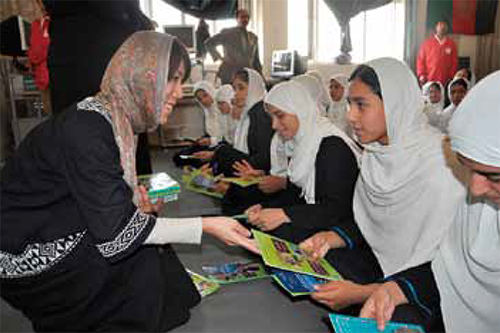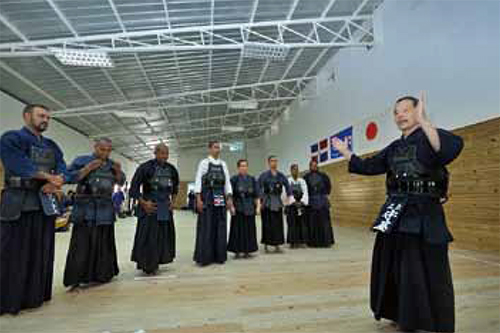Diplomatic Bluebook 2014 Summary
Chapter 4
Japan’s Diplomacy Open to the Public
1. Japanese Society and People Deepening Their Ties with the World
Increasing the number of people traveling between Japan and other countries stimulates the economy and promotes mutual understanding among different cultures. Based on this view, the Ministry of Foreign Affairs attaches significant importance to promoting exchange of people with other countries by facilitating the entry of foreign nationals to Japan and their stay in the country, as well as by supporting the activities of Japanese citizens in the international community.
The number of foreign nationals visiting Japan reached approximately 10.36 million in 2013 (up from 8.36 million in 2012), for the first time exceeding the government’s target of attracting 10 million visitors to Japan. Moreover, although the number of foreign residents in Japan (mid to long-term residents and special permanent residents) has declined since it peaked at the end of 2008 following the global financial crisis, its figure stood at approximately 2.05 million at the end of June 2013, about 1.2 times more compared with the number of approximately 1.69 million in 2000.
The Ministry of Foreign Affairs has been relaxing visa requirements to contribute to the promotion of Japan as a tourism-oriented country, which is one of the key pillars of the Japan Revitalization Strategy. In 2013, capitalizing on the occasion of the 40th year of ASEAN–Japan Friendship and Cooperation, it introduced measures on visa exemptions and multiple- entry visas 9 for visitors from ASEAN member states. These measures are believed to have been a factor behind the record number of foreign visitors to Japan in 2013. Although relaxing visa requirements has such an effect, it is nonetheless important to ensure strict visa screening in order to prevent the entry of foreign nationals who could harm Japan’s interests. The Ministry of Foreign Affairs works on this issue comprehensively in cooperation with relevant ministries and agencies.
With an aging and shrinking population, it is becoming ever more important for Japan not only to attract foreign tourists, but also to secure the human resources needed to support the Japanese economy, irrespective of their origin. Since 2005, against this backdrop, the Ministry of Foreign Affairs has been arranging international symposiums and workshops on the acceptance of foreign nationals and their integration into Japan, aiming to encourage debate among people by providing occasion to discuss concrete challenges and measures taken arising from the acceptance of foreign nationals and their integration into Japan. In 2013, discussion was held focusing on foreign residents in the context of large-scale disasters. The participants shared the recognition that foreign nationals should be regarded as those contributing to Japanese society in times of a large-scale disaster by sharing their experiences and lessons.
Today, it is more important than ever to develop “All-Japan” diplomacy, utilizing the strengths of non- governmental bodies in Japan. For example, in recent years, against the background of growing public interest in international cooperation, the role of non- governmental organizations (NGOs) have increased their importance as channels for offering policy proposals and conducting support activities in developing countries. In the field of development assistance, NGOs play a significant role in dealing with diplomatic issues relating to such matters as human rights, disarmament, policies on human trafficking, and United Nations (UN) reform. Recognizing this, the Ministry of Foreign Affairs regards NGOs as important partners in international cooperation and is striving to strengthen partnerships in promoting such cooperation through financial assistance, environmental improvements, and policy dialogue.
 Mine safety education program implemented by the Association for Aid and Relief, Japan (AAR) (Afghanistan; Source: AAR/JPF)
Mine safety education program implemented by the Association for Aid and Relief, Japan (AAR) (Afghanistan; Source: AAR/JPF)
Participants of the volunteer programs operated by the Japan International Cooperation Agency (JICA), including the Japan Overseas Cooperation Volunteers (JOCV) and Senior Volunteers (SV), are crucial actors in the field of international cooperation. They see the development challenges faced by a country from the same perspective as local people and work hard together to tackle them. Such programs are highly appreciated by various countries, as initiatives that typify Japan’s approach of visible accountability. In addition, they play a substantial role not only in the economic and social development of the country concerned, but also in fostering mutual understanding, friendship, and goodwill between Japan and developing countries. Furthermore, these programs are tremendously significant because the knowledge and experience of the volunteers are fed back into Japanese society once they return home. In light of the globalization of corporate activities, the Private Sector Partnership Volunteer system was established (FY2012) to meet the needs of small and medium-size enterprises (SMEs) and other private-sector companies aiming to expand their business overseas. Thus, JICA volunteer programs are being utilized to support efforts by companies and other organizations to nurture personnel with a global outlook.
 A Senior Volunteer teaches kendo at a university in the Dominican Republic. Since 2011, kendo has been included in the physical education classes conducted as part of this university’s academic program, as a means of building character.
A Senior Volunteer teaches kendo at a university in the Dominican Republic. Since 2011, kendo has been included in the physical education classes conducted as part of this university’s academic program, as a means of building character.(Source: Koji Sato / JICA)
Local governments and communities play a substantial role in building good and multi-layered international relations in a wide range of fields. In recent years, local governments and communities have actively pursued wide-ranging international and economic exchange initiatives. The role played by local governments and communities in diplomacy is absolutely crucial from the perspective of fostering mutual international understanding, developing relationships of trust, and strengthening the Japan brand. The Ministry of Foreign Affairs regards local governments and communities as important partners in promoting diplomacy and aims to reinforce the comprehensive diplomatic capacity of the nation as a whole. To this end, the Ministry of Foreign Affairs attaches considerable importance to (1) communicating the appeal of Japan’s local communities to the world, (2) supporting the international initiatives of local communities, and (3) providing extensive information about international exchange. The Ministry of Foreign Affairs has been undertaking various measures, using Japan’s diplomatic missions overseas, which local governments are encouraged to utilize to promote their international and economic activities abroad; regional promotion seminars, which offer local governments the opportunity to introduce various features of local regions for the diplomatic corps in Japan; diplomats’ study tours, as part of which the diplomatic corps visit local regions and learn their charms, such as cultural heritage, advanced industry and technology, and so on; and the local government partnership forums and Kansai local government partnership symposiums, which provide a chance to explain important foreign policy to officials of local governments. In particular, the Ministry of Foreign Affairs is conducting a variety of initiatives to support measures to counter the damage arising from harmful rumors in the aftermath of the Great East Japan Earthquake, as well as efforts to revitalize local industries and local economies.
